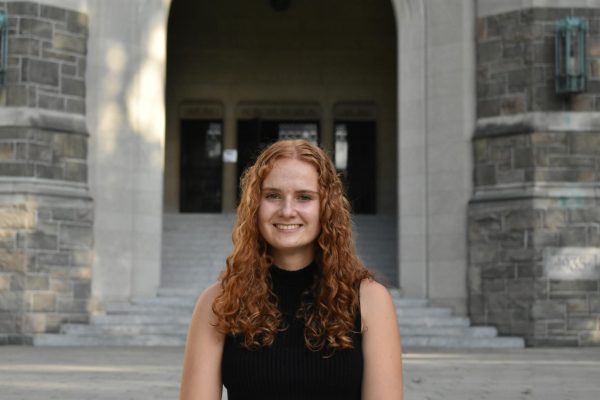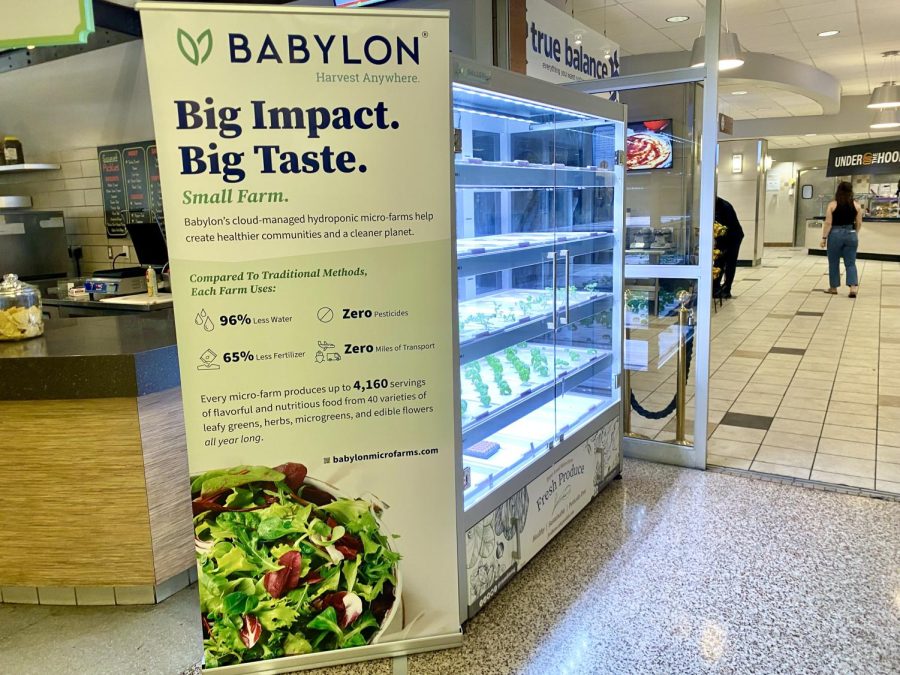Fordham’s Marketplace Introduces “Babylon”
The Marketplace inside the McShane Campus Center recently added a new display by its entrance that advertises sustainable eating and locally-sourced food. The display features a glass box, known as the “micro-farm,” with various green plants growing inside it.
“The display shows progressive, live growth of herbs and greens that will be used in select items in Community Dining at [Lincoln Center] and in the Marketplace at [Rose Hill],” said Deming Yaun, university dining contract liaison.
Fordham’s new micro-farm comes from the company Babylon. The company advertises itself as a way to grow food sustainably and aesthetically. The company also claims that the use of its vertical products is great for places where space is limited.
Babylon remotely maintains Fordham’s garden. They can control the environment and atmosphere inside the case.
“For those interested, the garden is watched via the internet by Babylon. They control water and light and advise harvest time and provide pre-planted seedlings to start the process over,” said Yaun.
The food grown at Fordham’s micro-farm goes directly into the food at the Marketplace. According to a video posted to the Ramdining Instagram, the produce is harvested directly from the cases by opening up the back and is then used in salads and other dishes.
Yaun said that using this display is more effective than shipping vegetables in terms of the adverse environmental effects and cost.
“These will become ingredients in the food prepared on-site. In addition to being garden fresh, shipping costs and energy used to get the greens to
Fordham is much less, and there is less packaging used,” said Yaun.
Yaun said this initiative came about because of student’s interest to be more environmentally cautious.
“Most students come to us very educated and interested in sustainability. This is one way to take some of the abstract nature about our food supply and turn it into a tangible example. It should be educational and interesting at the same time,” said Yaun.
Climate change and the current method of food production are closely linked. The process of transporting food across long distances results in increased carbon emissions. Finding enough space to grow food can result in deforestation. Cattle and other livestock’s grazing and waste release methane which can lead to rundown land, causing floods.
The issue with mass food production was another motivator for Yaun when creating this display.
“[The display was prompted by] becoming as sustainable as possible, with the goal of someday being 100% sustainable is the big motivator.
Worldwide, the rising temperature of the climate has slowed, and it has long been demonstrated that vegan/vegetarian diets are more sustainable than other diets,” said Yaun.
Yaun said that he hopes students engage with the display. According to Yaun, the new display provides a way for students to see how food grows , which they may not have had the opportunity to see before.
“Students should be excited about this first step in Fordham growing and supplying fresh ingredients to be used in dishes here on site,” said Yaun.
“Some of us have never seen a garden grow, the remarkable speed that the same space can produce multiple harvests.”
Some students have noticed the micro-farm in the Marketplace and are excited about it.
“I was curious about the case when I first saw it. I think it’s cool that you can watch produce grow,” said Jeremy Fries, FCRH ’24.
Others have even noticed and taken an interest in the specific type of produce the case is growing.
“I’m really excited about the plants growing. I’m most excited about the basil, I can’t wait to see it incorporated into the food in the cafeteria,” said Claire Bickel, FCRH ’24.
According to Yaun, while the micro-farm serves as a way to source vegetables sustainably, it also provides a simple reminder to students of where food comes from.
“[The micro-farm] is a way for all of us to be in touch and to see and be reminded that produce does not have to always come cello wrapped,” said Yaun.

Isabel Danzis is a senior from Bethesda, Md. She is double majoring in journalism and digital technologies and emerging media. The Ram has been a very...







































































































































































































